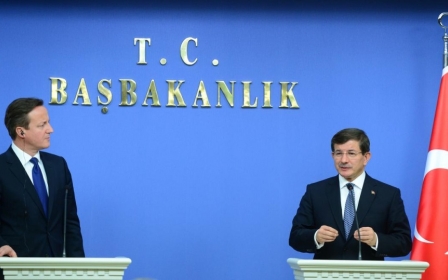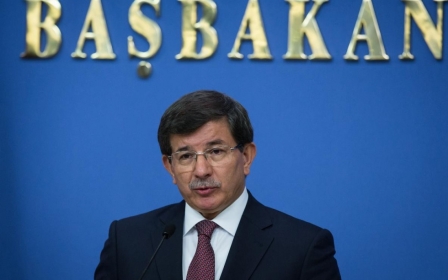ANALYSIS: Are Turkey and the EU rekindling their love?

The European Union's representatives on foreign policy, enlargement and humanitarian aid paid an important visit to Turkey last week, just a month after their appointments. While EU Foreign Policy Chief, Federica Mogherini delivered the union's concerns about sanctions against Russia and European militants fighting in Syria, Turkey's accession negotiations to the EU was also on the table.
"We need to improve on the alignment on foreign policy and security policy. It's never been so low and this is a problem for the European Union, but it is mainly a problem for Turkey," Mogherini said during a press conference in Ankara.
Similar concerns - albeit from a more UK-centric point of view - were voiced by British Prime Minister, David Cameron during his visit last Tuesday. Speaking at a joint press conference with Turkish Prime Minister, Ahmet Davutoglu, Cameron urged for more cooperation regarding information sharing between the two countries.
"This is all about making sure people are safer in Turkey, and making sure people are safer back home in the United Kingdom," the British PM said.
The EU delegation also highlighted the need for more coordination to diversify Europe's energy supplies. This comes after Russian President Vladimir Putin announced his decision to kill the South Stream natural gas pipeline planned through Eastern Europe and to step up an alternative supply route to Turkey.
Though Turkey has the same priorities for diversification of energy supply routes, it is playing a complex energy game in the region.
Furthermore, as Turkey did not join the western sanctions against Russia over the ongoing crisis in Ukraine, the EU has been busy urging Turkey to revert its stance. Or at the very least refrain from taking advantage of the current situation by exporting certain products to Russia, such as agricultural goods.
Accession negotiations
The emphasis given to the sanctions against Russia and militants in Syria by European officials also signal to what extent the EU is prioritising the admittance of Turkey to the union.
Since the beginning of the current phase of European integration, which dates back to the forming of European Coal and Steel Community in 1952, Turkey has striven to become a member of the EU and its predecessors.
Turkey started its partnership with the European Economic Community (the official name for the EU before 1992) back in 1963 with the hopes of gains eventual accession. In 1987, it submitted its official application for full membership. However, it wasn’t until 2005 that Turkey officially began negotiating the accession criteria.
While the accession process has been marred with ups and downs, the EU's enlargement into Eastern Europe after the fall of communism slowed down Turkey's integration with the bloc. The EU had to make a tremendous effort to successfully incorporate former Soviet states, and in the meantime, kept Turkey hanging.
Yet, almost a decade after negotiations began, little has come of the process. So far, out of the 35 chapters of the “acquis communautaire” (the total body of the EU law), only one chapter has been closed, while 14 chapters are being negotiated. A further 17 have been frozen due to the opposition from Cyprus and France over Turkey's unwillingness to open its ports and airports to traffic from Cyprus.
In the wake of opposition from individual EU members and Turkey's disillusionment with the slow pace of the accession process, negotiations have stalled.
Barriers to entry
Former French President Nicolas Sarkozy and German Chancellor Angela Merkel are the leading figures opposing Turkey's accession to the EU. On multiple occasions, Sarkozy voiced his disapproval over Turkey's potential membership. Similarly, Merkel has put forward the idea of a "privileged partnership" with Turkey, instead of full membership. However, the content of this partnership has never been clear.
Cyprus is also another major stumbling block, as half of the country is under de facto control of the Turkish Republic of Northern Cyprus, a pseudo country that is only recognised by Turkey. Under international law, Northern Cyprus is considered under Turkish occupation.
Despite all the hurdles, a revitalisation attempt was initiated in October 2014. "The time has come to put the accession process back on track," former Commissioner for Enlargement and the Neighbourhood Policy, Stefan Fule said at the press conference of the 2014 Enlargement Package in Brussels.
According to Emre Gonen, a professor focusing on the EU-Turkey relations at Istanbul Bilgi University, the recent visit of the European Commission delegation is a visible sign on the part of the EU that it is hoping revive the ailing relations between the two parties.
However, he believes that this visit is nothing more than a "gesture of goodwill". There are still so many chapters to be opened by the "intergovernmental conference" that the prospect of unfreezing 17 chapters seems to be dim.
Speaking to Middle East Eye, Gonen added that: "It is difficult to see how such negotiations could resume. To add insult to injury from the EU side, the European Parliament has chosen only Greek or Greek Cypriot parliamentarians as co-chairs of Joint Parliamentary Committee."
The committee is an EU body responsible for scrutinising the application of the Customs Union and following in particular the progress of the accession negotiations.
Moreover, years of stalled relations and significant developments in Turkey's domestic affairs have changed the conditions of negotiations. Though Turkey fulfilled the Copenhagen political criteria, serious setbacks in the areas of democratic governance and human rights in recent years now threaten Turkey's political eligibility. The Copenhagen criteria define the eligibility of an aspiring country to be admitted into the bloc in line with the EU institutions.
According to Cengiz Aktar at Suleyman Sah University, the Turkish government's attitude regarding domestic as well as foreign policy is the main source of further delays.
"Turkey no longer fulfils Copenhagen political criteria domestically and unnecessarily flexes its muscles in Cyprus," the EU expert told MEE.
Though the Justice and Development Party government made significant legislative reforms to protect freedom of expression and human rights in first the decade of 2000s, serious setbacks over the past few years threaten those gains.
Just a week after the EU delegation visit to Turkey, the police raided the offices of the top selling newspaper in Turkey and detained 27 people. The EU Foreign Policy Chief Mogherini expressed the bloc's concerns with a written statement on Sunday: "This operation goes against the European values and standards Turkey aspires to be part of and which are the core of reinforced relations."
On a defiant move, President Erdogan hit back at Moghrerini's remarks and said the EU cannot interfere in steps taken […] within the rule of law against elements that threaten our national security even if they are members of press."
An external dimension is also at play. In response to Cyprus' efforts to harvest natural gas in the newly discovered fields in Eastern Mediterranean, Turkey sent warships to the Cypriot Exclusive Economic Zone in October. Following this provocative move, European officials see Turkey as being the sole source of deadlock.
Changing priorities, differing views
In the wake of the Islamic State's (IS) destabilising effects in Syria and Iraq, as well as the desire of European foreign fighters to return to their own countries, security concerns seem to be overshadowing Turkey's accession talks.
For Gonen, the EU is frightened by the possibility of having an increased wave of immigrants from the Middle East, especially Syria. "There is a real fear of Islamist fighters having their ‘baptême de feu’ (baptism by fire) in Syria and going back to their original country in the EU to take part in terrorist acts," he said.
In fact, Cameron's visit came after the UK stepped up plans to cancel passports of returning IS fighters, hinting that the visit was more about Britain's urgent needs than Turkey's accession to the EU.
Though the leaders of both countries reiterated their deepening cooperation to fight effectively against IS, Turkey's insistence on establishing a no-fly zone in Syria with possible "safe havens" to stop a potential refugee influx is the main source of disagreement.
This picture sheds light on the present situation: Turkey and its European counterparts are deeply divided in their foreign policy priorities and the end result consolidates Turkey's further isolation in the surrounding region.
Aktar believes that currently for Europe, Turkey's admission to the bloc is no longer a priority. "EU wants to keep Turkey in check to prevent any harms that it could inflict on them," he argued.
"The EU's priority now is to convince Turkey to adopt harsher anti-terror measures against the returning jihadists and join the sanctions against Russia," Aktar added.
Yet while Turkey appears to increase its anti-terror measures in line with European requests, it has not signalled any change in its policies towards Russia.
As long as the Russian card remains on the table, no actor could possibly talk about "normalisation" in Ukraine and Syria.
According to a recent policy paper titled Turkey and the European Union: A Journey in the Unknown, published by the Brookings Institution, Turkey has three possible options regarding the EU: "competition and conflict", "cooperation" and "convergence".
The author, Nathalie Tocci, an expert on the EU-Turkey relations and special adviser to the EU high representative and vice president of the commission, believes that the future trajectory of the relationship remains highly uncertain.
The direction will be up to the administrations of both parties, as well as international political conjuncture, but current picture does not appear to be promising a "cooperation", let alone "convergence".
In this context, Gonen believes that relations could be defined as "tour d'horizon", or summary, without any tangible decision to be taken in the near future.
Aktar is on the same page: "While the EU officials will mostly talk about anti-terror measures in relation to Syria and sanctions against Russia, Turkey will act as if the accession negotiations are on track."
New MEE newsletter: Jerusalem Dispatch
Sign up to get the latest insights and analysis on Israel-Palestine, alongside Turkey Unpacked and other MEE newsletters
Middle East Eye delivers independent and unrivalled coverage and analysis of the Middle East, North Africa and beyond. To learn more about republishing this content and the associated fees, please fill out this form. More about MEE can be found here.




